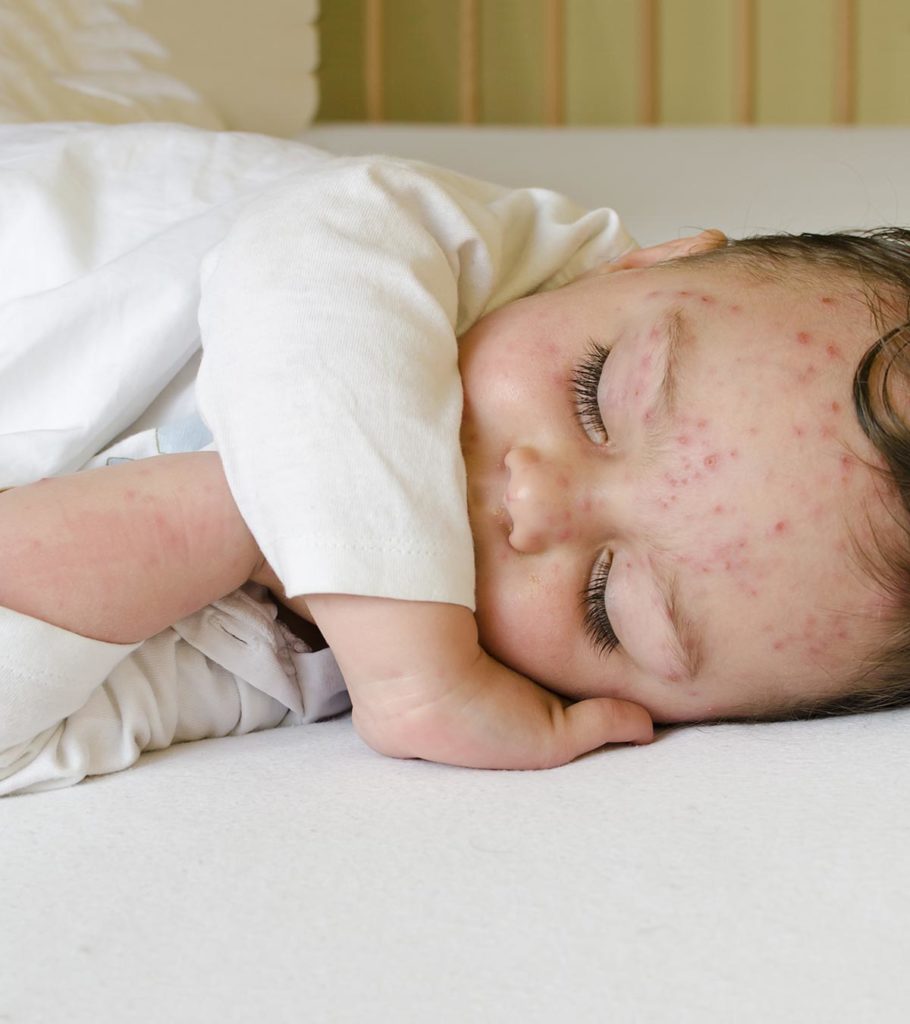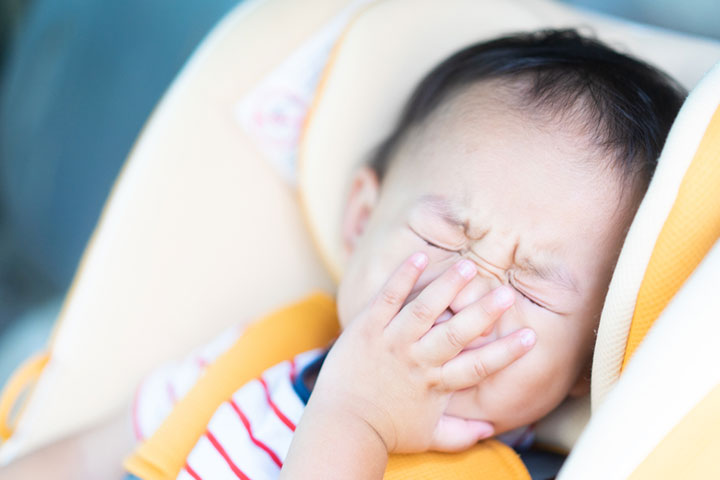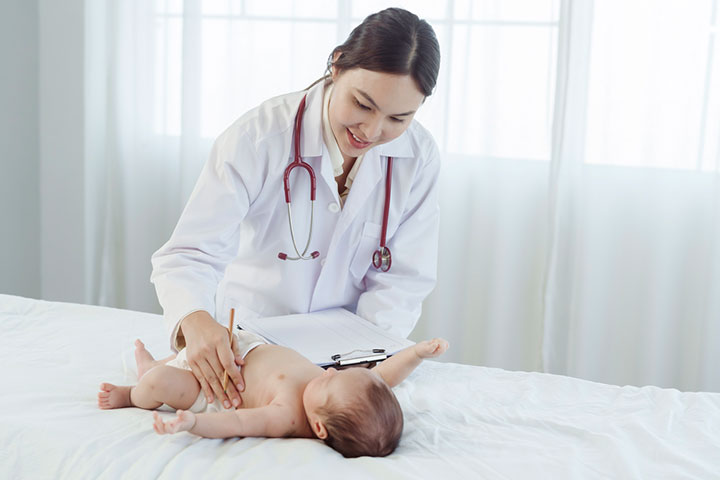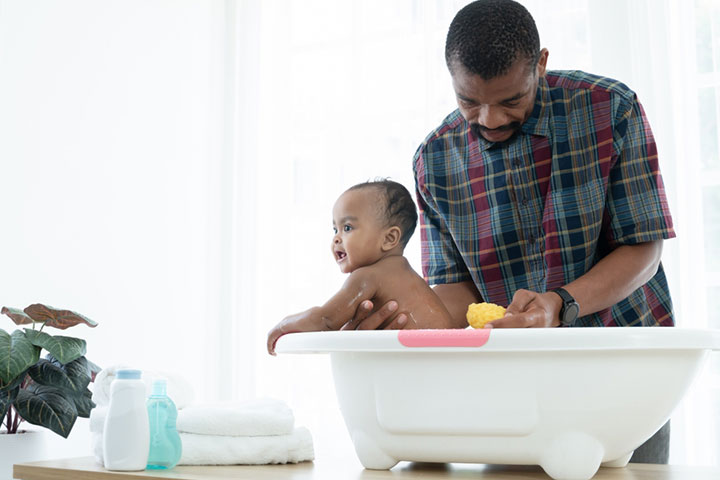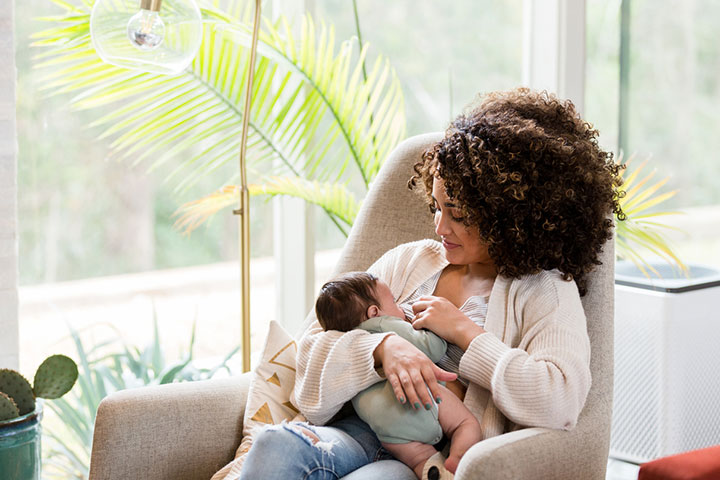Chickenpox is a highly contagious viral infection. Chickenpox in babies can cause fever, symptoms resembling the common cold, and an itchy rash that later forms blisters. Thankfully, the vaccine available against this infection has successfully decreased the infection rate in infants.
Read on as we explain how the virus can affect your baby and tell you about its symptoms, diagnosis, complications, and more.
What Is Chickenpox And What Causes It?
Chickenpox, also called varicella, is caused by the varicella-zoster virus, which belongs to the herpes virus family. The varicella virus is also responsible for the disease called shingles (also known as herpes zoster), a condition far common in adults over the age of 50 (1). However, chickenpox is most common among younger individuals. According to experts, chickenpox is commonly a childhood disease as it mostly affects children under ten years of age (2) So, let’s take a look at the causes of chickenpox in babies.
How Do Babies Get Chickenpox?
A baby gets chickenpox when he is exposed to the varicella virus. And, an infant can contract the virus in the following ways:
- If the baby is touched or held by a person suffering from chickenpox or shingles.
- Inhalation of sneeze droplets or coming in contact with the saliva.
- Coming in contact with personal items, such as utensils, toys, etc., of an infected person
The symptoms are highly discomforting to the baby and infection is contagious.
What Are The Symptoms Of Chickenpox In Babies?
The incubation period of the varicella virus can range from 10-21 days. It means the baby will display the following signs of chickenpox latest by 21 days after contracting the virus (3):
- The baby will have a fever with a temperature of above 100.4°F (38°C)
- Red rashes and blisters are the primary tell-tale sign of chickenpox. Rashes first appear on the head and face, eventually spreading all over the body. Rashes go through five stages with each lasting for about 24 hours. The five stages are red bumps, watery blisters, cloudy blisters, open sores, and dry brown crusts or scabs. The crusts mark the last stage of the disease. New lesions continue to erupt for 3-5 days, so you may notice all five at once on different parts of the baby’s body.
- Sores are also called ulcers, and are tiny red patches that you will spot inside the mouth, eyelids, and on the genitals of the infant.
- Cold-like symptoms such as a runny nose, cough, and sneezing.
- The baby may have constant or recurrent abdominal pain and a significant decrease in appetite.
- Body pain and general fatigue as the infant seems drowsy and tired all the time, which is compounded by muscles and joint pains.
Chickenpox is not life-threatening but in certain cases you need to take the baby to the doctor immediately.
When to rush to a doctor?
In some cases, there may be pus and bleeding from the rash. This indicates a bacterial infection, and you must take your baby to the doctor immediately. Other alarming symptoms include:
- Fever higher than 102°F or 38.9°C
- Bleeding from the rashes
- Extreme drowsiness and unconsciousness
- Severe cough or any difficulty breathing
The doctor will be able to diagnose the situation and check for its severity.
How Is Chickenpox In Babies Diagnosed?
The doctor will use one or both of these methods to diagnose the disease:
- Visual observation: Most doctors diagnose the disease through the visual inspection of the chickenpox rash, which is distinctive.
- Blood test: A blood test is done in the case of doubt, or to reconfirm the diagnosis from visual observation.
Depending on the baby’s condition and the severity of the disease, the doctor suggests treatment methods.
How Is Chickenpox In Babies Treated?
According to the American Academy of Pediatrics (AAP), chickenpox does not require any medical treatment, and you seldom have to take the baby to a pediatrician (4). You have to wait for the baby’s immune system to overpower the virus and clear it on its own. . The doctor may prescribe the infant an antihistamineiXA class of medications used to treat allergies by blocking the action of histamines (allergens).to bring down itchiness, but it is usually not necessary.
However, there are some antiviral medications that are prescribed only to teenagers and older individuals, if they have allergic conditions such as eczema and asthma.
Without medications, a baby with chickenpox will recover in five to ten days from the first emergence of the symptoms. But do remember home management plays a crucial role in the baby’s road to recovery.
How Can You Help A Baby With Chickenpox Feel Better?
You can take the following steps to improve the baby’s speed of recovery (5):
- Adequate rest: Like any other viral illness, in chickenpox too, the baby needs plenty of rest to help the body recover quickly. Let your baby sleep and rest a lot in a comfortable environment.
- Lots of fluids: Continue breastfeeding the usual way to provide fluids and nourishment to the baby. If the baby is older than a year, then you can give him liquid food such as chicken broth and lentil soups. A liquid diet can help the baby get all the nourishment as he may have trouble eating solid food due to stomach pain and ulcers in the mouth.
- Trim fingernails to discourage scratching: Your baby is going to pick the rashes. When the rash turns into a watery blister, it is quite likely to rupture. To prevent this from happening, trim the nails. If the baby is old enough to understand “no”, then gently tell him not to scratch his rashes.
- Cool water sponge-bath: Use water at room temperature to sponge the baby’s rashes once a day. You can also give the baby a bath. These will help reduce the intensity of itching.
- Calamine lotion and acetaminophen: You can use a calamine lotion made for babies to relieve the irritation and acetaminophen (paracetamol) for fever. However, consult a pediatrician before using these medicines.
Although chickenpox is manageable at home, it is better to prevent the infection than deal it with later.
How To Prevent Chickenpox In Babies?
Chickenpox vaccine alone can protect the baby even if he is exposed to the virus. The widespread introduction of the vaccine in 1995 has significantly brought down the infection rate. It is, hence, the most accurate and widely used prevention method. Besides the vaccine, the following measures can help.
- Keeping away from infected individuals: If someone in the family has chickenpox, then the infant should never be allowed anywhere close to that person. Also, keep the baby away from items used by the infected person.
- Maintain general hygiene: Keep the baby’s personal items and surroundings clean. Wash his hands when he comes from outdoors, keep his toys clean, and wash his utensils thoroughly. Viruses can stay dormant on inanimate surfaces and infect when contracted.
These methods, along with the vaccine, ensure that the baby is not infected by the virus.
When Can A Baby Have Chickenpox Vaccine?
Chickenpox vaccine consists of two immunization shots. The first shot is administered when the baby is between 12 and 15 months old. The second shot is a booster given between four and six years. The second immunization shot reinforces immunity for a lifetime. Therefore, both shots are mandatory for immunity against the varicella virus (6).
A version of chickenpox vaccine called MMRV is also available. MMRV is a combination vaccine that protects against four pathogens namely measles, mumps, rubella, and varicella. The vaccine is administered at the same stages of life as the standard chickenpox vaccine. MMRV vaccine is as effective as the stand-alone chickenpox vaccine.
When babies are given vaccines, they may come down with a fever or body aches. But, this is temporary and uncommon. However, there could be a few other side-effects.
Are There Any Side Effects Of Chickenpox Vaccine?
Yes, there could be a few side effects, but short-lived and uncommon. Here is what to look for:
- Redness and swelling at the site of injection. It will also feel tender and warm on touch. It is the most common, yet mild side effect of the chickenpox vaccine.
- A mild fever of about 100.4°F (38°C). It happens less frequently with only one in ten infants suffering from it.
- Mild blisters and rashes resembling the chickenpox rashes. It is a less common side effect affecting only 4% of individuals who receive the immunization.
- SeizureiXSudden and abnormal surge of electrical activity in the brain characterized by jerking body movements and loss of consciousness.and pneumonia are extremely rare and are almost never seen unless the baby has poor health or some other illness.
Take your baby to a doctor if you suspect the baby is showing any signs of side effects. However, do not panic.
How To Prevent The Side Effects Of Chickenpox Vaccine?
There is no single way to prevent the side effects as they are less likely to occur and are usually benign. Parents who are concerned, however, can choose the single chickenpox vaccine over the combined MMRV. Medical experts have noted that administration of MMR and chickenpox vaccine separately significantly brings down the chances of side effects (7). MMRV is offered as a matter of choice. Parents can always choose a vaccine by considering specific pros and cons after a discussion with a pediatrician.
Although probable side effects of chickenpox and MMRV vaccine exist, medical experts believe that the side effects are better than not having the vaccine at all. The AAP states that it is safer for a baby to get a chickenpox vaccine than getting chickenpox itself (8). But, there could be some rare cases when a baby may not be eligible for vaccination.
When Can A Baby Not Have Chickenpox Vaccination?
According to the CDC, the following group of infants should not get vaccinated (9):
- Infants who suffered life-threatening side effects or reactions to first shot, are not given the second dose.
- Infants with HIV/AIDS are not capable of handling the vaccine, as their immune system is weak. Thus, they suffer from fatal side effects.
- Infants with cancers, including those undergoing cancer treatments such as chemotherapy, should not be given the vaccine.
- Infants with allergy to gelatiniXA translucent substance derived from collagen, known for its gel-forming property, used for culinary and medicinal purposes.and antibiotic neomycin have displayed severe side effects to chickenpox vaccine.
If a baby is just unwell (like with cold or flu) before the vaccination, then the doctor will recommend a later date for immunization, after the baby recovers.
In the cases where a vaccination cannot be given, there are ways of preventing the infant from contracting the viral infection, and therefore the disease.
How To Protect Unvaccinated Babies And Those Under 12 Months?
Avoiding exposure is the only way to prevent chickenpox in babies who cannot be vaccinated. Be vigilant about the baby’s health. Do not take the baby out often, especially to crowded places such as the day care, malls, exhibitions, etc.
For babies below 12 months, the best method of prevention is avoiding exposure to the virus and breastfeeding. Medical experts recommend breastfeeding as the best way of protecting unvaccinated infants against chickenpox (10). Breastfeeding offers some protection if the mother has had chickenpox earlier in life. Breast milk is rich in antibodies that help boost the baby’s immunity. The mother’s antibodies against chickenpox pass on to her baby through breast milk. This is called passive immunity. Breastfeeding may not guarantee prevention but provides significant protection.
Breastfeeding is also good if the mother has never had chickenpox. There are other antibodies and compounds in the milk that nurture and strengthen the baby’s immune system (11).
Chickenpox is rarely fatal. But in some cases it could lead to complications.
Are There Complications Of Chickenpox?
Complications of chickenpox are rare and mostly occur among infants with immunodeficiency. The following are the complications (12):
- Streptococcal infection: Bacterial infection of the rashes and blisters by streptococcus bacteria
- Pneumonia: A lung infection caused by several different types of bacteria or viruses
- Sepsis: Bacterial infection of blood and blood vessels
- Infection of the brain: Examples of such diseases are cerebellar ataxiaiXImpaired functioning of the cerebellum (a region in the brain) characterized by sudden, uncoordinated movements. and encephalitisiXA severe inflammatory brain condition resulting from an infection or autoimmune response.
- Dehydration: Primarily due to high fever and poor appetite
Chickenpox is seldom fatal and most infants recover without any complications. According to the World Health Organization (WHO), chickenpox vaccine alone has reduced the global outbreaks of chickenpox by 70%. Vaccination is thus the best means of protecting the baby against the disease.
The only long-term complication of chickenpox is shingles that can also affect healthy infants later in life.
In the next section we cover the commonly asked questions about chickenpox.
Chickenpox in babies and toddlers is considered to be common. However, since the virus spreads via people, it is important to keep babies away from potential sources of infection. The AAP states that the symptoms of chickenpox do not require any treatment since they heal by themselves. However, if your child develops a high fever, drowsiness, or bleeding from the rash, take them to the doctor for treatment. It is also important that you vaccinate your baby against chickenpox to prevent further risk of infection.
Key Pointers
- A baby can develop chickenpox through exposure to an affected person or their belongings.
- Symptoms of chickenpox in babies include high body temperature, blisters and rashes, body pain, and cold-like symptoms.
- Home management is essential as it may take 5 to 10 days for the baby to recover from chickenpox without using any medication.
- Effective ways to manage chickenpox at home include having proper rest, staying hydrated, and using a cool water sponge-bath.
- Chickenpox vaccination can provide lifetime immunity, but babies under one year must be kept safe from contracting the virus.
- Although rare, chickenpox can lead to severe complications, such as sepsis, pneumonia, and dehydration.
